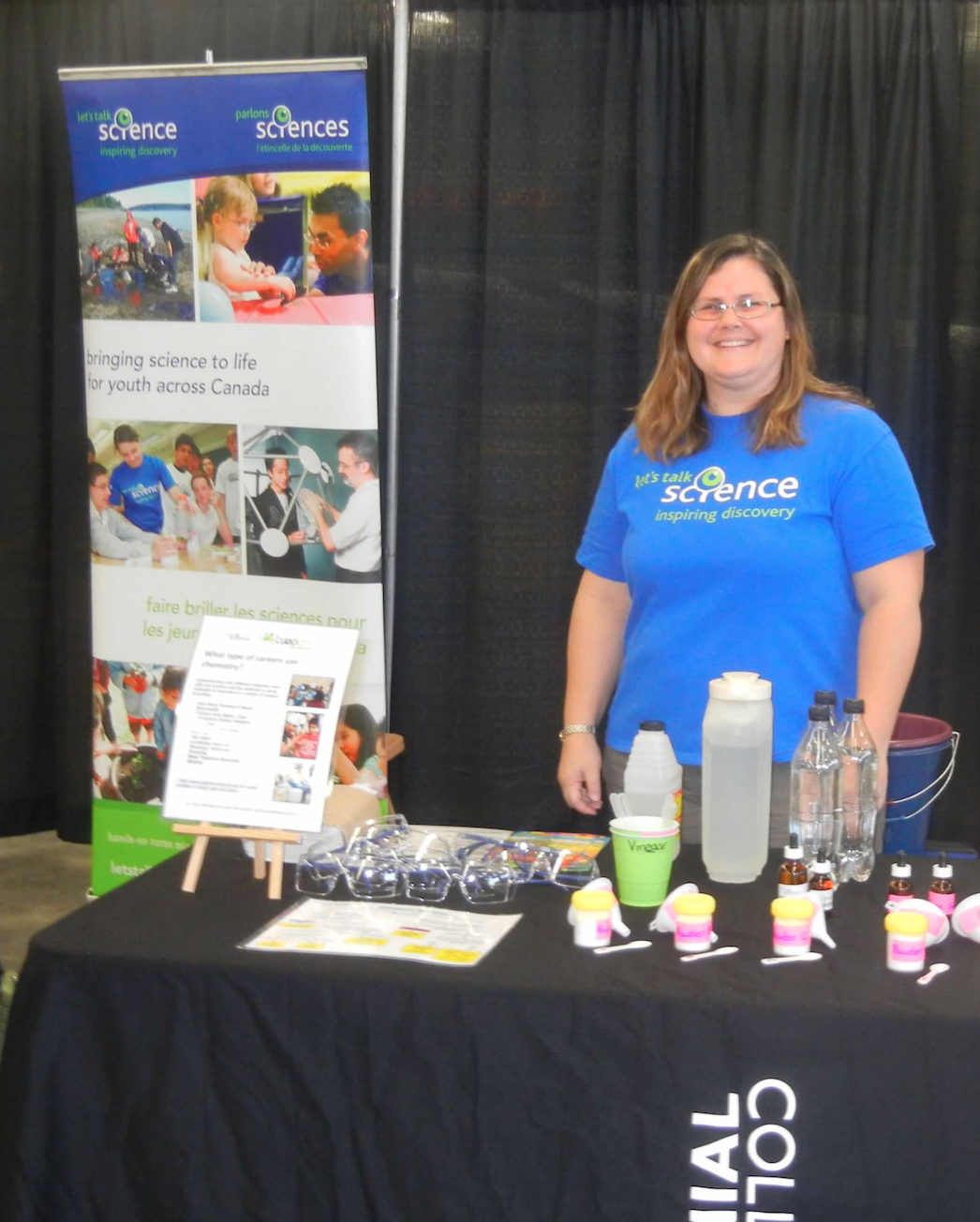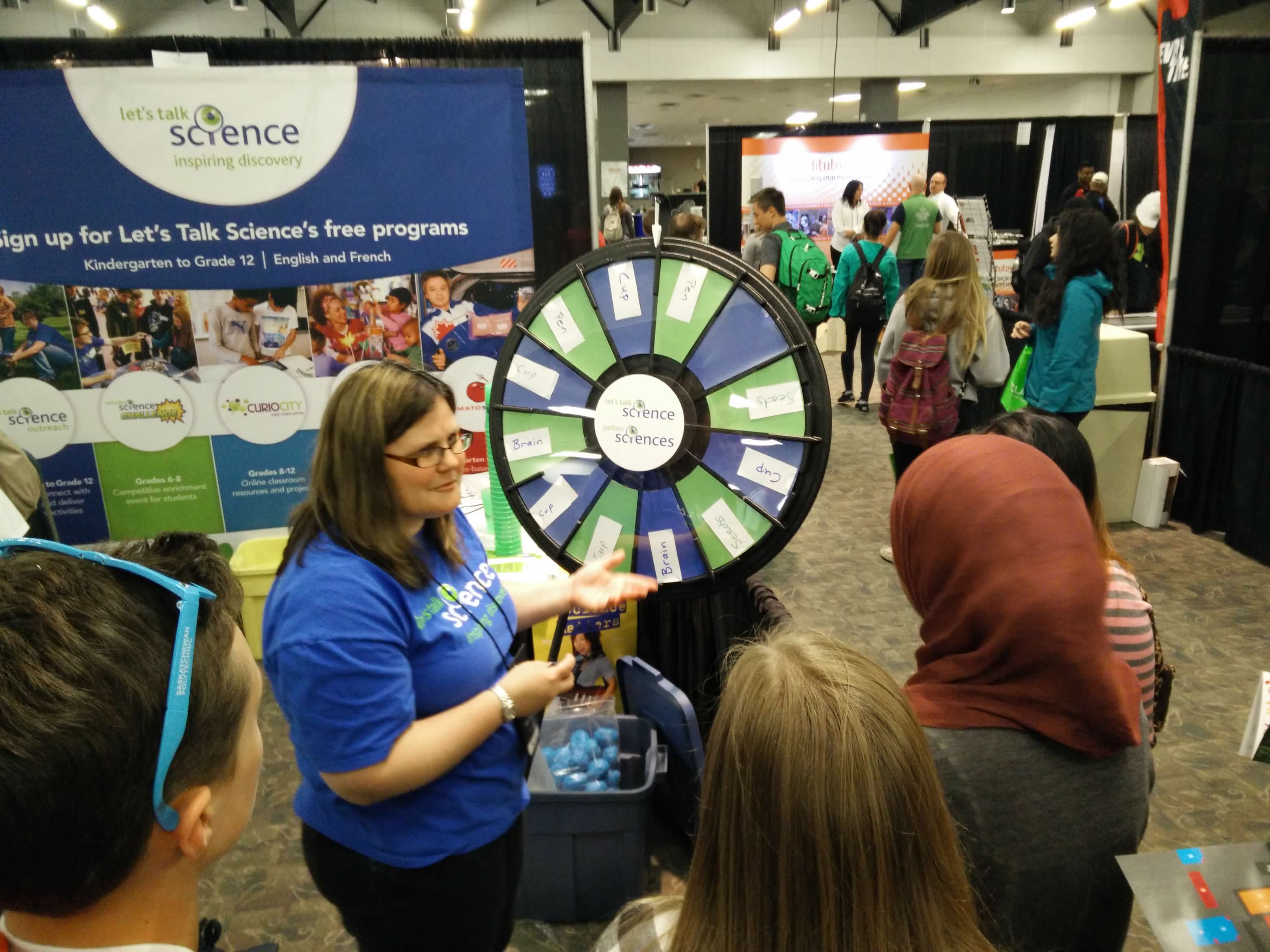Glenda Casimir is perhaps one of the people who knows Let’s Talk Science best. Coming up on her 25th anniversary of working at the organization, Casimir’s experiences with Let’s Talk Science started even longer ago as a volunteer. “When I was an undergrad at Western, I volunteered for four years,” says Casimir. She had a lot of fun visiting Girl Guide and Scout groups and participating in festivals, so much so that she didn’t want to leave. “I told Let’s Talk Science that I could still volunteer over the summer if they needed people at festivals and events,” remembers Casimir. “I was still on their contact list, which is how I found out they were looking for a summer student. I was not loving the job I was in, so I emailed them: ‘I’m interested!’” Casimir graduated with her Bachelor of Science in Ecology from Western University in April of 1999; in May, she began working full-time for Let’s Talk Science and never looked back.

Over her nearly 25 years at Let’s Talk Science, Casimir has held many positions ranging across several departments, from Volunteer engagement to Human Resources to Alumni and Community Partnerships. She has seen it all: “I’ve experienced all the different program areas, including the ones that don’t exist anymore.” For the past five years, Casimir has been working as the Manager of Insights. “My role is really to understand our audiences,” reveals Casimir. “Whether it’s educators, youth, or volunteers, I want to gain a good understanding of what they are thinking so that I can help support the program or other teams to make sure we’re meeting the needs of those users.” One of the things Casimir loves most about her current position is the diversity it offers: “It looks like a lot of different things,” says Casimir. “Sometimes it’s about analyzing different data, sometimes it’s speaking to the audience directly, sometimes it’s doing user testing on projects that are just getting started, or feedback after the fact.”
Casimir has seen a lot of growth over the past three decades, but the two areas she finds most impressive are the size of the organization and the diversity of programs Let’s Talk Science now offers. “When I first started, there were maybe ten of us, and now there’s over 100. That blows my mind,” Casimir says. “And the diversity of our programs, what we offer and who we offer to, is huge now.” She credits the internet specifically for helping Let’s Talk Science expand its programming and reach more and more students and educators each year: “It’s crazy to me to think that we can reach all these different corners of Canada now.”

Of all the programming Let’s Talk Science offers, Casimir says she has a soft spot for the career-based initiatives the organization promotes. “As a student, especially when I was in high school and going into university, I had no idea what I wanted to do,” admits Casimir. Because she was a fan of science and math, everyone around her told her to go into engineering, which she agreed to because it felt like a safe choice. “I quickly found out engineering was not for me,” she recalls. “I had to figure out what to do next. I remember walking over to the Faculty of Science and trying to figure out what else I could take instead.” Because of her own experiences and those she sees in other students, Casimir values the diversity of Let’s Talk Sciences career profiles. “Our niche for careers is more exploratory,” she says. “You can explore different profiles and unique paths you didn’t even know existed. I think it’s important for us to support that discovery experience for kids.”
The growth she has witnessed isn’t limited to the organization but also exists in the larger arena of STEM education. “I feel that 90% of people recognize what the term means now, and that wasn’t always the case,” says Casimir. “I think there is this awareness about STEM itself—what it is and why it’s important—that wasn’t there before.” She stresses the skills gained from studying science and math as crucial parts of STEM education: “We’re not trying to create all these little Einsteins. If they don’t go into science, that’s okay, as long as they have some degree of awareness and scientific literacy,” Casimir says. “If they can ask good questions and think critically about things, that’s what matters. Not just that they know what a lever is.” In a world plagued by many issues, such as climate change, the water crisis, and political instability, the ability to ask thoughtful questions, dissect data, and critically analyze information is more important than ever. “I think more and more all of these global issues will somehow relate to some sort of science or STEM,” says Casimir. “We need to teach students how to navigate through these problems critically, how to ask the right questions, and how to determine what is misinformation.”
Having been a volunteer herself—and working with volunteers through her time at Let’s Talk Science, Casimir has more than a few pieces of advice for current students volunteering across the country. “Embrace it,” she urges. “As little or as much time as you can volunteer is okay. Even if you can only show up for one event, the benefits you can gain from that experience and seeing the difference you can make for students, it’s incredible.” Casimir hopes that all volunteers recognize the impact they make by sharing their passion with students, whether that passion be genetics, coding, or rockets. Engaging with kids about what you love can inspire them: “You’re sharing this huge passion, this thing that you love, and it truly impacts people. I’ve seen it.” The other big piece of advice Casimir has to offer volunteers is to not discount their experiences just because they are unpaid. “These are the skills you can put on your resume,” states Casimir. “Communication, marketing, managing a team, compassion; these are all things employers are looking for.”
As she reflects on the past three decades of Let’s Talk Science and looks towards the future, Casimir’s biggest hope is that we can all be critically engaged, good citizens. “Always ask yourself questions,” she urges. “Make good decisions based on sound critical thinking.” Casimir doesn’t want everybody to go into science, but she does hope everyone can take the skills they learn in STEM and apply them to their everyday lives. “I hope we can all be super awesome citizens and ask ourselves great questions. That’s the way forward.”